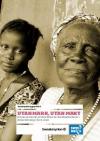Utan mark, utan makt : Kvinnorna utan rätt att fatta beslut när Swedfund investerar i Addax Bioenergy i Sierra Leone

| Upphovsperson: | Whålin, Malena |
|---|---|
| Utgivare: | Swedwatch | Svenska Kyrkan |
| Tidskrift/källa: | Swedwatch Report |
| År: | 2013 |
| Ämnesord: | Sierra Leone, Energi, Bioenergi, ekonomiska förhållanden, Ekonomisk utveckling och tillväxt, Land, Land acquisition, Kvinnofrågor, Arbetsrätt |
Rapporten ”Utan mark, utan makt” granskar hur ett bioenergiprojekt i Sierra Leone lever upp till svenska och internationella utvecklingsmål. Svenska statens utvecklingsfinansiär Swedfund har investerat 90 miljoner kronor av den totala investeringen på 2,4 miljarder kronor i företaget Addax Bioenergy. Företaget backas även upp av sju andra utvecklingsbanker från olika länder. Företaget odlar sockerrör och ska producera etanol till den europeiska marknaden samt elektricitet till den nationella marknaden i Sierra Leone.
För sin verksamhet arrenderar Addax Bioenergy ett markområde på 44 000 hektar av lokalbefolkningen i 92 byar i norra Sierra Leone. De självförsörjande bönderna får 55 kronor per hektar och år i arrende.
Trots att Addax Bioenergy har ett ambitiöst hållbarhetsarbete visar Swedwatchs granskning att det finns stora utmaningar i projektet. Att investera i ett storskaligt jordbruk i ett fattigt postkonfliktland som Sierra Leone ställer krav på breddade perspektiv, långsiktighet och - kanske framför allt - lokalbefolkningens inkludering och involvering. Swedwatchs studie visar att kvinnor har begränsade möjligheter att dra nytta av projektet. De får inte äga mark enligt de lokala traditionerna. Det är i stor utsträckning kvinnorna som brukat och rört sig på marken men de har haft mycket begränsat inflytande i förhandlingarna och får sällan del av arrendet. De berörs i hög grad av projektet men har av på grund av sin underordnade ställning sämre tillgång till information och klagomålsmekanismer och sämre chanser till arbete än männen.
Kvinnor behöver ges fler möjligheter att dels delta i avtalsprocessen, dels dra nytta av projektet. Löpande kommunikation med lokalbefolkningen bör förbättras och utgå ifrån lokala behov, språk och traditioner så att ett meningsfullt deltagande möjliggörs.
Marken ska enligt avtalen arrenderas i 50 år framöver och bioenergiprojektet är ännu bara inne på sitt tredje år. Förväntningarna på de utvecklingseffekter det ska ge är höga både bland investerare och lokalbefolkning. Swedwatchs fältstudie har visat att det finns allvarliga risker att projektet inverkar negativt på människorättssituationen i de berörda byarna. Om projektet ska generera en tillväxt som kommer lokalbefolkningen till godo och stärker hela Sierra Leone så bör projektet i högre grad utgå ifrån deras behov. Idag saknar lokalbefolkningen korrekt information eller förståelse för projektet och många har arrenderat ut sin mark för att de upplever att de blivit lovade arbete.
I de byar som Swedwatch besökt råder stor besvikelse över att inte fler har fått jobb och att säsongsanställningarna skapar stor osäkerhet. Upplevelsen av svikna löften har lett till en spänd situation mellan företaget och lokalbefolkningen som var tydlig under Swedwatchs besök och som visade sig i en protest mot företaget som riskerade att bli våldsam.